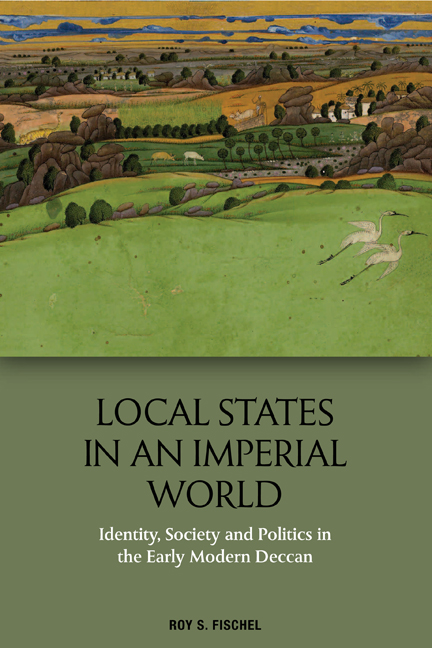Book contents
- Frontmatter
- Contents
- List of Illustrations and Tables
- Note on Transliteration
- Acknowledgements
- Introduction
- 1 Mapping the Deccan
- 2 The Sultanates and the Deccan
- 3 Foreigners, Locals and the World
- 4 Locality, Vernacular and Political Language
- 5 Limitations of the Deccani System
- 6 Conclusion: Hoopoes and Falcons
- Bibliography
- Index
6 - Conclusion: Hoopoes and Falcons
Published online by Cambridge University Press: 26 September 2020
- Frontmatter
- Contents
- List of Illustrations and Tables
- Note on Transliteration
- Acknowledgements
- Introduction
- 1 Mapping the Deccan
- 2 The Sultanates and the Deccan
- 3 Foreigners, Locals and the World
- 4 Locality, Vernacular and Political Language
- 5 Limitations of the Deccani System
- 6 Conclusion: Hoopoes and Falcons
- Bibliography
- Index
Summary
The history of the early modern Deccan reveals parallel trends which were seemingly contradictory. The region was unified in many respects: geographically, politically, historically and culturally. The various factors of unity came together to define the Deccan as a discrete space, distinct from both Vijayanagara to the south and the Mughal Empire to the north. Accordingly, early modern sources, as well as modern historiography, have treated the Deccan as a single, coherent historical and geopolitical entity. This unity, however, was limited to only certain aspects. In other respects, the Deccan has been a composite and diverse space, divided according to numerous lines. The most easily traceable division was along political lines: the region was home to simultaneous dynasties, closely linked to one another yet who perceived themselves as independent. Most prominent of these were the Nizam Shahs, ᑦAdil Shahs and Qutb Shahs, by the side of the significantly weaker ᑦImad Shahs, Baridis and numerous local potentates. While the Deccan sultanates saw prolonged periods of conflict, in particular, in the western Deccan, their core regions remained stable throughout the period, limiting shifts to their border regions only.
Politics was only one aspect of intra-regional divisions. Elite society itself was far from homogeneous. On the contrary, at the very heart of each sultanate stood a complex elite which was diverse in terms of religion, language, class, caste and occupation. Both local and foreign groups took part in various aspects of the political, military, economic and cultural life of the sultanates. Most identified with the local political system were the group known as Deccanis, a term broadly referring to those Muslims who saw the Deccan as their home. The Deccanis hailed from diverse backgrounds: some were local converts, others, the descendants of migrants from north India, yet others were new migrants who struck roots in the region. By their side, in all sultanates, members of trans-regional communities, self-styled Foreigners, became a crucial part of the elites. Organised in locality- or family-based networks, many Foreigners combined personal interests in trade, scholarly pursuits, and administrative and military positions. Those Muslims from Iran and elsewhere in West and Central Asia presented a rejection of the locality in favour of a continuously itinerant lifestyle.
- Type
- Chapter
- Information
- Local States in an Imperial WorldIdentity, Society and Politics in the Early Modern Deccan, pp. 236 - 260Publisher: Edinburgh University PressPrint publication year: 2020



